Department of Medicine
Allergy & Immunology Fellowship
Contact Us
Allergy and Immunology Fellowship
Explore This Fellowship
Welcome
Welcome to the Massachusetts General Hospital Allergy/Immunology Fellowship Training Program. Our mission is to train future leaders who will inspire and push the leading edge of medicine in patient care, teaching and research. We accomplish this by providing outstanding clinical training, a strong collaborative research environment, supportive mentoring, and a broad range of educational opportunities. This is possible through our outstanding clinicians, nationally and internationally recognized leaders in clinical, translational and basic science research, and faculty deeply dedicated to fellow education. The unique learning opportunities at MGH and the resources available in the broader Harvard community can help trainees develop their unique career interest.
Program Overview
We recruit two fellows each year from trainees who have completed residencies in internal medicine, pediatrics or medicine/pediatrics. The first two years of the program are devoted to fulfillment of the requirements for certification by the American Board of Allergy and Immunology. The first year is primarily clinical with a focus on developing excellent clinic skills in the inpatient and outpatient setting. During the first year of training the fellow selects a faculty preceptor, who will provide mentorship in research in subsequent years. The fellowship is accredited by the American Board of Allergy and Immunology, a conjoint group that includes input from the American Board of Pediatrics and the American Board of Internal Medicine.
Rebecca Saff, MD, PhD, Allergy and Immunology Fellowship Program Director, discusses the fellowship program.
How to Apply
The Mass General Hospital Fellowship in Allergy and Immunology processes fellowship applications through the Electronic Residency Application Service (ERAS) Fellowship Applicant site.
Related Inquiries
- For questions about the curriculum – Rebecca Saff, MD, PhD, Fellowship Director
- For administrative questions – Lauren Baino, Fellowship Coordinator
Interested applicants must submit all of the following documents through ERAS by the second Friday in August 2021:
- ERAS application
- CV
- Personal statement
- USMLE transcripts
- Three letters of recommendation
- Photo
- Valid ECFMG certificate (foreign medical graduates only)
Interviews will be held in September and October 2021.
Additional Information
- American Academy of Asthma, Allergy and Immunology (AAAAI)
- Instructions for Applying to Fellowships with ERAS
- ERAS Fellowship Documents Office (EFDO)
Curriculum
The first year of fellowship is dedicated to building clinical skills, both inpatient and outpatient, in all aspects of allergy and immunology. The second year of fellowship provides protected research time to develop skills and expertise in a chosen area with close mentorship.
During the first year, fellows have weekly continuity clinics in adult and pediatric allergy/immunology clinics as well as rotations in clinics in other specialties, including the Clinical Immunology Lab, PFTs, Drug Allergy testing, Dermatology, Pediatric Dermatology, Contact Dermatitis, ENT, Infant food challenges, Immune deficiency, Eosinophilic Esophagitis, and Genetics.
The second year of fellowship provides protected research time to develop skills and expertise in a chosen area with close mentorship. In addition to the junior and senior mentors involved directly in the project with the fellow, a research advisory committee meets with the fellow 2-3 times a year to help mentor and guide the fellow and allows for additional feedback outside of the fellows’ direct advisors. Fellows will continue to see patients for 1-2 half days per week and help to supervise venom desensitizations and aspirin desensitizations on those days.
Conferences
Didactic conferences (clinical years) are held on a regularly scheduled basis with attendance required of all first and second year fellows and divisional faculty. Attendance is encouraged in subsequent year trainees.
Weekly Conferences
- Allergy/Immunology Grand Rounds
- Immunology tutorial
- Case conference
- Immune deficiency case conference (every other week)
- Medicine Grand Rounds (optional)
- Pediatric Grand Rounds (optional)
Monthly Conferences
- Mass General/BWH-combined allergy/immunology fellows conference
- Boston city-wide allergy/immunology rounds
- Rapid fire journal club
Quarterly Conferences
- Partners Asthma Center Rounds (optional)
Annual Conferences
- Weeklong introductory course for allergy/immunology fellows through Brigham and Women's Hospital
- During the first two years of training, each fellow will attend at least one national allergy conference (AAAAI or ACAAI)
Teaching Opportunities
Opportunities are available for teaching residents and medical students rotating through the allergy and immunology elective programs. Allergy and immunology fellows are encouraged to participate in and contribute to house-staff conferences at Mass General. This includes the education of medical students, residents, attending physicians, other allied health personnel and patients. Fellows participate in and present at the conferences, journal clubs and seminars listed above and are actively involved in teaching the house staff during the inpatient consultations and as the house staff rotating through the allergy ambulatory clinics.
Clinical Training
Clinical Experience
The core clinical activities of the Allergy and Immunology Fellowship take place at Massachusetts General Hospital in the dedicated Allergy and Immunology outpatient suite located on the second floor of the Cox building and on the patient floors during inpatient consultations. Fellows rotate in the subspecialty clinics within Allergy/Immunology as well as outside the specialty (Dermatology, Occupational Health, Genetics, Pulmonary, and ENT at Massachusetts Eye and Ear Institute). The fellowship does not include in-hospital call. Fellows are on call from home at nights and weekends on a shared basis with other fellows in the program.
Ambulatory Experience
The first year fellows participate in the Adult Allergy/Immunology Clinic at Mass General and in the Pediatric Allergy/Immunology clinics of Mass General for Children. In these settings, the trainee interacts with patients who have allergic or other rhinitis, sinusitis, asthma, atopic dermatitis, hypersensitivity to foods, drugs, or stinging insects, urticaria and angioedema and other immunologic diseases, including autoimmune and immunodeficiency diseases. Fellows are assigned patients whom they treat and monitor longitudinally over the period of their fellowship, always appropriately supervised by dedicated attending faculty members. Generally, fellows see an average of 3-6 patients per half-day session. The experience provides an opportunity to develop an understanding for the natural history of these conditions over an extended period of time. The outpatient experience continues in a limited way in year two to ensure that our MD trainees meet the training requirements of the ABAI and is not required in subsequent research years. The acquired skills include the development of an appropriate differential diagnosis, diagnostic evaluation strategies and treatment plans. Communicating with the referring physicians and ensuring support for continuing care of the patients’ allergic condition is central to the consultative service.
Inpatient Experience (Consultation Service)
Fellows rotate on the inpatient Allergy/Immunology Consultation Service at Mass General, Mass General for Children and Massachusetts Eye and Ear. The Consultation Service includes the supervised evaluation of inpatient consultations on patients admitted to Mass General and Mass Eye and Ear who present with or develop allergic or immunologic problems, as well as the continued daily longitudinal follow-up of these patients during their hospitalization. A fellow performs literature research on topics appropriate to the case, and will participate actively in the teaching activities to the consulting team, especially as it pertains to house staff. In all cases, a written report of consultation is completed in the electronic medical record. At all times immediate faculty supervision is available. Mass General and Mass Eye and Ear serve frequently as tertiary (and occasionally quaternary) referral centers and carry a high census of extremely complex medical and surgical patients. The acquired skills include the development of an appropriate differential diagnosis, diagnostic evaluation strategies and treatment plans. Communicating with the referring physicians and ensuring support for continuing care of the patients’ allergic condition is central to the consultative service.
Research Training
A fertile environment for physician-scientists and PhD scientists with an interest in allergic diseases exists in the Center for Immunology and Inflammatory Disease (CIID) at the Mass General-East Charlestown Navy Yard Research Facility. Faculty and fellow collaboration is at the heart of the research training program.
The basic science research training program is focused on training fellows in research in immunology and allergic inflammation. The CIID was established to serve as the basic and clinical science foundation for the clinical departments of Rheumatology, Allergy and Clinical Immunology. Offering a diverse, integrative and interactive training experience, exceptional investigators at Mass General and members of the Harvard Medical School Immunology Graduate Program are also included amongst research supervisors and mentors of our trainees. Under the guidance of the sponsor, the fellow learns to formulate hypotheses and design experiments to test these hypotheses, to perform laboratory techniques, to analyze data and to write manuscripts and grants. A diverse group of faculty with a wide range of research interests are available.
The Division of Rheumatology, Allergy and Immunology's Clinical Epidemiology Program focuses on training fellows in the principles of clinical research in the area of allergic and immunological diseases. Directed by Kimberly Blumenthal, MD, and located within the Mass General Department of Medicine's Mongan Institute, faculty members train fellows in research related to allergic and rheumatologic diseases using clinical research methods that include advanced informatics, clinical epidemiology, primary data collection and simulation science.
In addition, there is clinical and translational research ongoing across the spectrum of allergic disease including the Drug Allergy and Desensitization Program, the Immune Deficiency Disorders Program, and the Food Allergy Center.
Fellows may apply for admission to the Summer Program in Clinical Effectiveness at Harvard T.H. Chan School of Public Health, which is designed for individuals who want to develop their quantitative and analytic skills for clinical research. After completing this program, fellows may choose to go on to complete their master's degree in clinical epidemiology or public health.
Faculty
Allergy
- John Accarino, MD
- Aleena Banerji, MD
- Sara Barmettler, MD
- Kimberly Blumenthal, MD, MSc
- Carlos Camargo, MD, DrPH
- Michelle Conroy, MD
- Paul Hesterberg, MD
- Morris Ling, MD
- Maxim Lutskiy, MD, PhD
- Mandakolathur Murali, MD
- Michael Pistiner, MD, MSC
- Rebecca Saff, MD, PhD
- Wayne Shreffler, MD, PhD
- Caroline Sokol, MD, PhD
- Jamie Waldron, MD
- Michael Wilson, MD, PhD
- Anna Wolfson, MD
Division of Rheumatology, Allergy, Immunology Clinical Epidemiology Program
Center for Immunology and Inflammatory Diseases
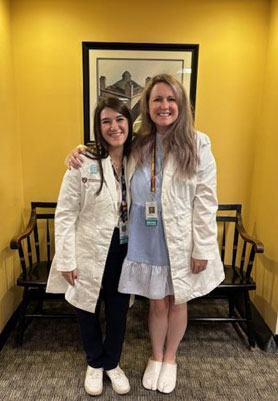
Current Fellows
Danielle Crabtree, MD
First-Year Clinical & Research Fellow
Hometown: Portland, OR
University: Reed College
Residency: Massachusetts General Hospital (Internal Medicine)
Favorite Food: I'm going to go with my beloved post-call food: Taco Bell
Favorite Hobbies: Various crafts, reading, going to the splashpad with my daughter
Fun Facts: I am obsessed with the Fast and Furious franchise. "I live my life a quarter mile at a time."
Where do you live: Charlestown
Research Interests: Immunodeficiency, immune modulating effects of breastmilk, healthcare disparities
I received my BA in History at Reed College, where I focused my studies on the intersection of legal history and racism in the US. After college I moved to New York and worked in book publishing for several years, during which time I worked on books including The Martian, Gone Girl, and Dark Matter. I decided to pursue medicine and moved to Philly, where I completed a post bac, followed by medical school at Jefferson. In Philly I met my partner and we moved together to Boston, where I trained in Internal Medicine at MGH. During my second year of residency we had a daughter, who brings us so much joy and wonder. I feel so fortunate to continue my training in Allergy and Immunology here, where there is such an incredible community of faculty, staff, and co-fellows to learn from every day.
Natalia Sutherland, MD
First-Year Clinical & Research Fellow
Hometown: Galax, Virginia
University: Emory & Henry College
Medical School: Virginia Tech Carilion School of Medicine
Residency: Massachusetts General Hospital - Internal Medicine
Favorite Food: Puerto Rican food- mainly mofongo
Favorite Hobbies: reading, watching movies and new TV shows, baking
Fun Facts: I was cheer captain of my college cheer team!
Where do you live: Medford, MA
Research Interests: Still looking into things but likely Immune Deficiency, Drug Allergy, and Medical education
I grew up in a very rural area in southwestern Virginia, where I went to college. After college, I moved to Roanoke, Virginia (~the big city), where I worked as a lab tech and manager while doing research. My husband and I met in the lab! I then went to medical school at VTC and was lucky enough to match at MGH for IM residency. In residency, I met some of my closest friends and am so excited to get to stay at MGH for A&I Fellowship! I've been so grateful to have received a warm welcome from the faculty and staff and am really looking forward to continuing my training here.
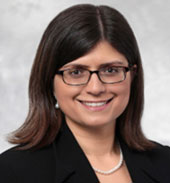 Seda Ekici, MD, PhD
Seda Ekici, MD, PhD
Second-Year Clinical & Research Fellow
Hometown: Ankara, Turkiye
University: University of Washington
Residency: University of Washington/ Seattle Children's Hospital
Favorite Food: Turkish Food
Favorite Hobbies: Traveling, movies, yoga, snorkeling, Zumba, going to concerts
Fun Facts: I'm an advanced scuba diver and participated in an exciting project focused on locating freshwater resources within the caves along the Mediterranean coast.
Where do you live: Belmont
Research Interests: Severe asthma, healthcare disparities in asthma, and food allergies
I was born and raised in Turkey and later moved to the United States to pursue my PhD at the University of Pennsylvania, where my research focused on cellular respiration and copper transport within respiratory complexes. Following my PhD, I attended medical school at the University of Washington in Seattle, where I also completed my pediatrics residency. Throughout my training, I have been deeply involved in initiatives aimed at addressing healthcare disparities and advancing cultural competency. In my personal time, I enjoy relaxing on the beach with my husband and two daughters, and I love traveling to discover new places. I am thrilled to join MGH for my fellowship and look forward to learning from the distinguished leaders in the field.
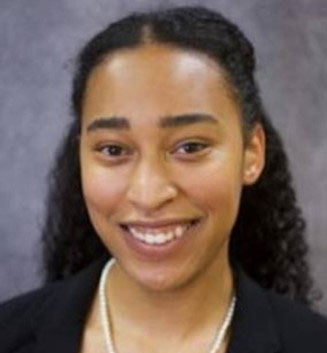 Alex Hairston, MD
Alex Hairston, MD
Second-Year Clinical & Research Fellow
Hometown: Portland, Oregon
University: Purdue University (Undergraduate degree); Howard University College of Medicine (MD)
Residency: MGH Internal Medicine
Favorite Food: Seafood boil (must have crab)
Favorite Hobbies: Exercise (soccer, slow running), watching movies/new TV series, trying new restaurants/cuisines!
Fun Facts: I played division one soccer at Purdue and grew up with 4 sisters, we all are very close.
Where do you live: Charlestown, MA
Research Interests: Drug Allergy, Healthcare Disparities, Medical Education
Briefly, I am originally from Portland Oregon however have been slowly making my way East throughout my life. I completed my undergraduate degree in behavioral neuroscience at Purdue University and then completed my Medical Doctorate at Howard University College of Medicine. I recently completed my residency in Internal medicine at MGH and matriculated through the Primary Care Track. I loved the departments’ commitment to creating a supportive environment for fellows, and I am very excited to be staying at MGH for my fellowship! Outside of the hospital I enjoy running, listening to music, reading (mostly fiction) and exploring the different neighborhoods of Boston with my husband.
Fellowship Life
One of our focuses is on promoting wellness and community within our fellowship and our division. To do this, we have a coaching program that matches fellows with non-supervisory faculty coaches who provide emotional and professional support to fellows to help them understand and use their strengths. We also organize activities that promote community and let us have fun together including:
- Annual weed walk
- Fall Apple Picking
- Book club
- Winter Holiday Party
- AAAAI 5K Run/Walk
- AAAAI Alumni Dinner
- Graduation
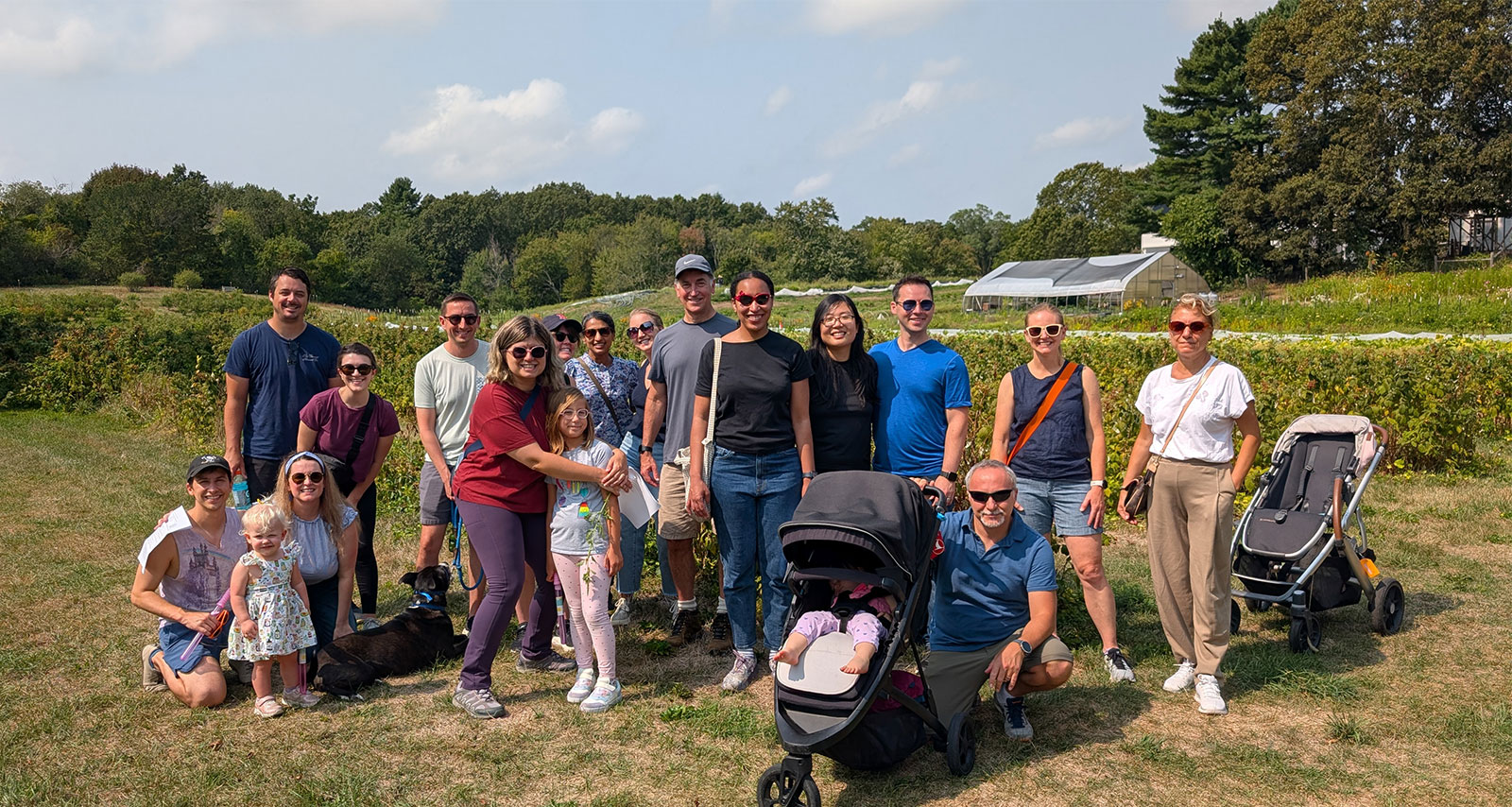
Weed Walk at Wright-Locke Farm in Winchester, MA, 2025. The fellows annually meet at a local farm for coffee and to walk around to learn about weeds.
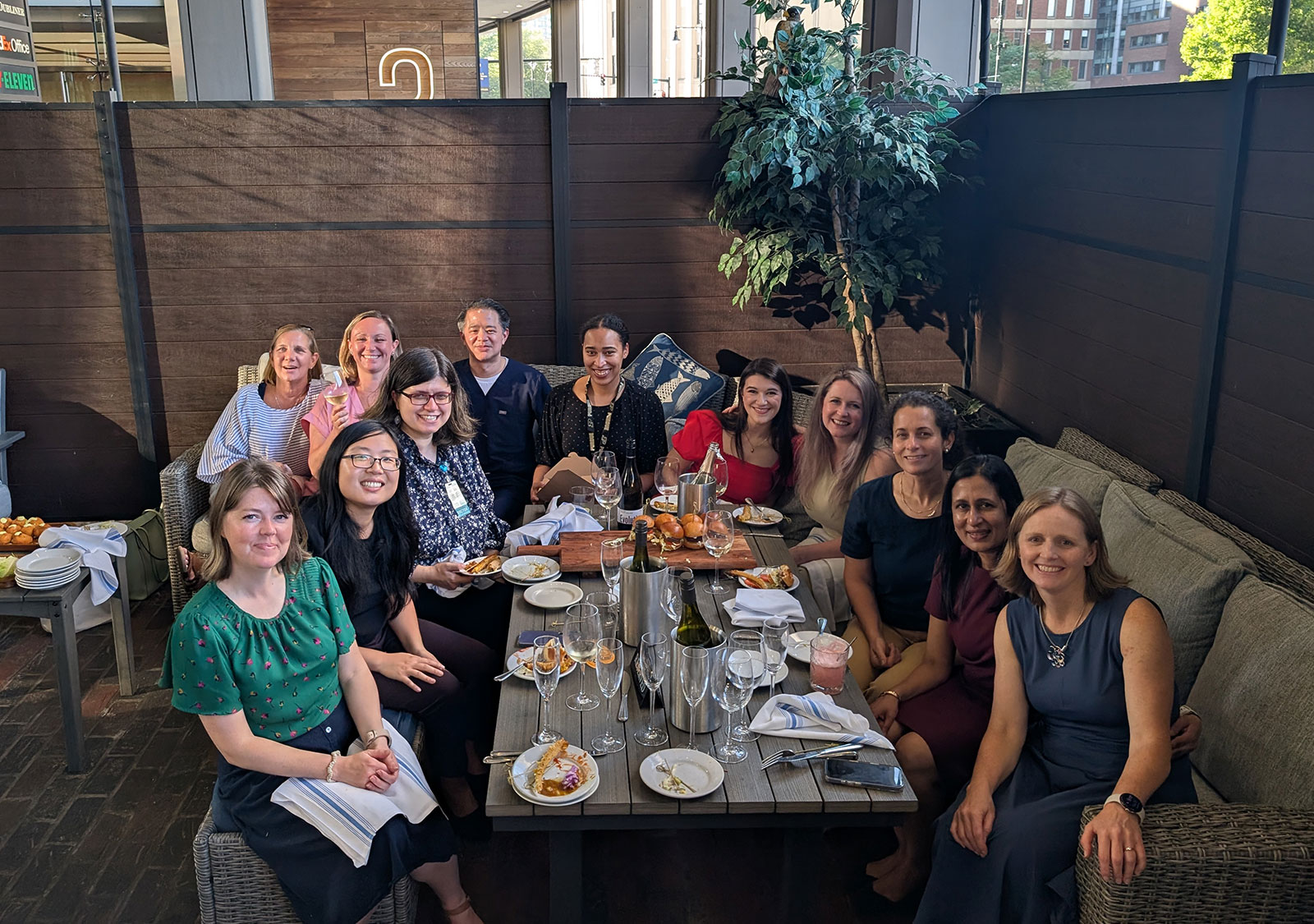
New Fellows' Welcome 2025
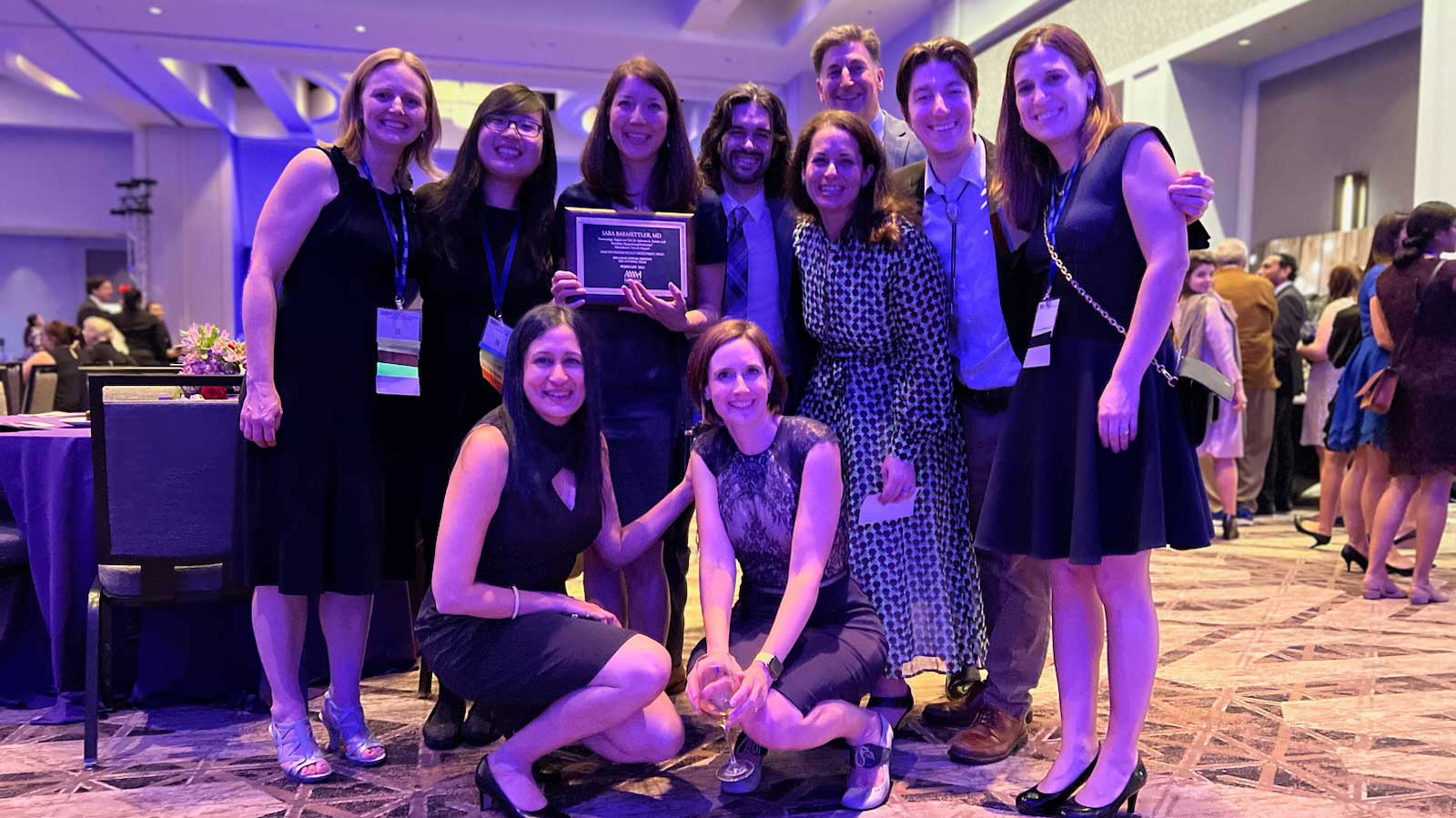
AAAAI Gala 2023

AAAAI Run 2023
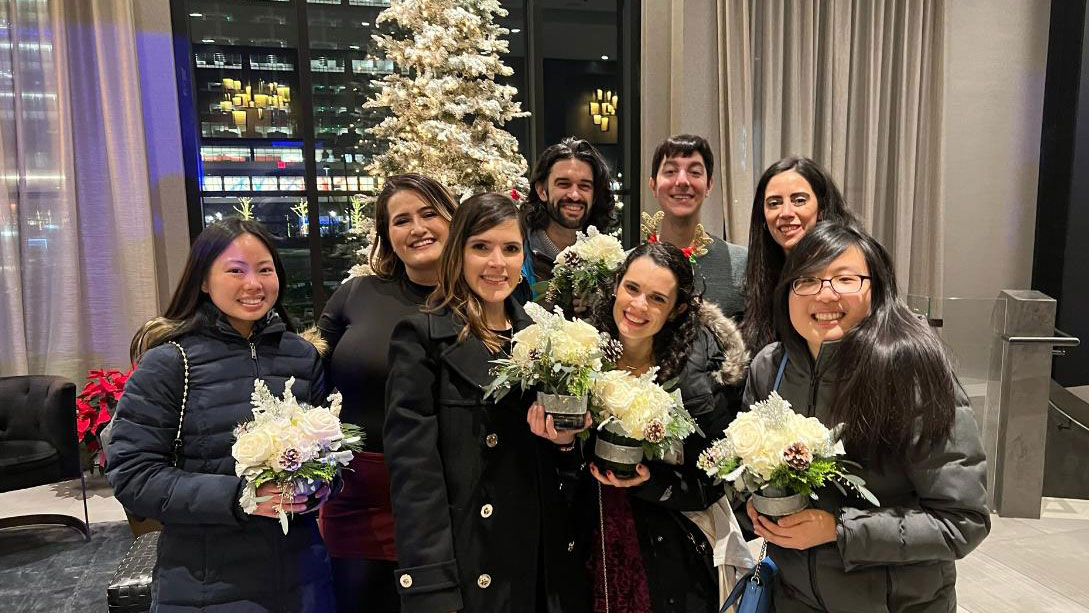
Holiday Party 2023
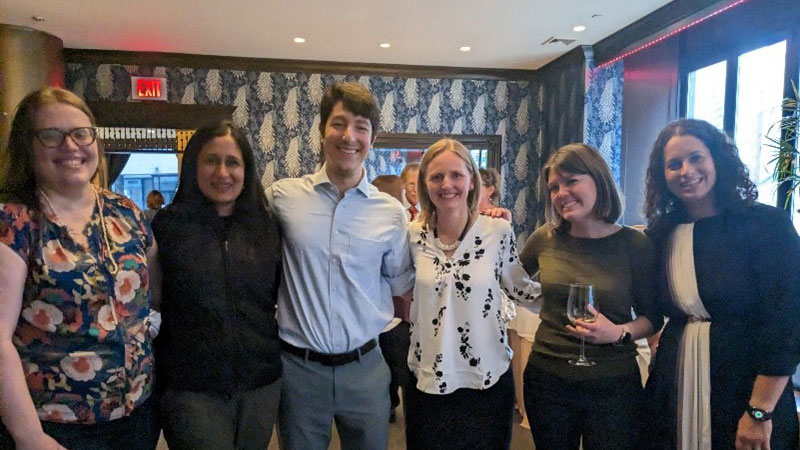
Fellowship Graduation 2023
Living in Boston

Boston is an incredible place to live, combining the charm and feel of a small city with amazing options for restaurants, museums, concerts, and sports. As the urban gateway to the surrounding New England region, Boston is an outdoor lover's paradise. You can hike the nearby White Mountains in the spring, head to the beaches of Cape Cod in the summer, pick apples and watch the leave change in the fall, and ski and ice skate through the winter. And as one of the leading healthcare and biotechnology clusters in the world, Boston is a truly great place to launch the next stage of your career.
History of the Program
Dr. Francis Rackemann, a clinician scholar, founded the Mass General Allergy Unit in 1919. He established a large outpatient clinic for the care of patients with allergic rhinitis and asthma. This clinic continues to flourish, under the current leadership of Dr. Aidan Long, offering care to patients with a broad spectrum of allergic and immunologic diseases.
In 1959, Dr. Francis Lowell was appointed chief of the Allergy Unit based on his ability to conduct clinical research. Drs. Lowell and William Franklin performed the first controlled studies of the efficacy of repeated injections of ragweed pollen extract in relieving the symptoms of ragweed allergic rhinitis. Beginning in the 1950s, there was a dramatic expansion of knowledge in basic immunology accompanied by the realization that immunologic concepts, techniques and therapies were applicable to the care of patients. In 1976, following the retirement of Dr. Lowell, Dr. Kurt Bloch was appointed to head the combined Allergy/Immunology Unit. Dr. Bloch established the Clinical Immunology Laboratory, which provides specialized Immunological testing for Allergy and Rheumatology, as well as for the entire medical community. The Clinical Immunology Laboratory continues to remain an important part of the division under the new leadership of Dr. Murali. During his 24-year tenure, Dr. Bloch expanded the impact of this unit on inpatient care. Several novel approaches were developed to desensitize patients who were dangerously allergic to drugs that were essential to their care.
In 2000 following the retirement of Dr. Bloch, Dr. Andrew Luster was appointed the chief of a new Division of Rheumatology, Allergy and Immunology at Mass General. This new division includes the former Allergy and Clinical Immunology Units and the former Arthritis Unit. The impetus for this new initiative was to develop a division within the Department of Medicine that would focus on the immunological and inflammatory basis of human disease. To accomplish this goal, the Center for Immunology and Inflammatory Diseases was established as part of the DRAI to serve as the basic and clinical science foundation for the clinical departments of Rheumatology, Allergy and Clinical Immunology. Dr. Luster, the division chief, is also the director of an NIH-sponsored training program in allergy and immunology research at the Mass General.
Graduates of the Allergy/Immunology Unit have contributed importantly to the field of allergy and immunology and hold leadership positions, including John Bienenstock (former medical school dean, chairman of pathology and professor of Medicine and pathology, McMaster University School of Medicine), Raymond Dattwyler (professor of medicine, New York Medical College), Theodore Freeman (chief, Allergy Unit, Lackland AFB), Richard Moscicki (chief medical officer, Pharmaceutical Research and Manufacturers of America), Yung Chyung (chief medical officer, Scholar Rock), John Leung (assistant professor, director of Center for Food Related Diseases, Tufts University School of Medicine) and Iris Otani (assistant professor, associate program director, UCSF). Many other graduates of our Allergy/Immunology Fellowship program practice allergy and clinical immunology in the Boston area and throughout the United States.
Clinical Immunology Laboratory
The Clinical Immunology Laboratory offers both educational services and a full range of clinical diagnostic services to the Mass General community.
Graduate Medical Education at Mass General
Learn from residents, fellows and program leaders about the exceptional learning experiences offered at Mass General.
Training & Employment Verification
Former faculty, fellowship alumni or residency alumni from the Department of Medicine can obtain verification of training and employment.
Allergy & Clinical Immunology Unit
We provide state-of-the-art care to patients with all major types of allergic and immunology disorders.
